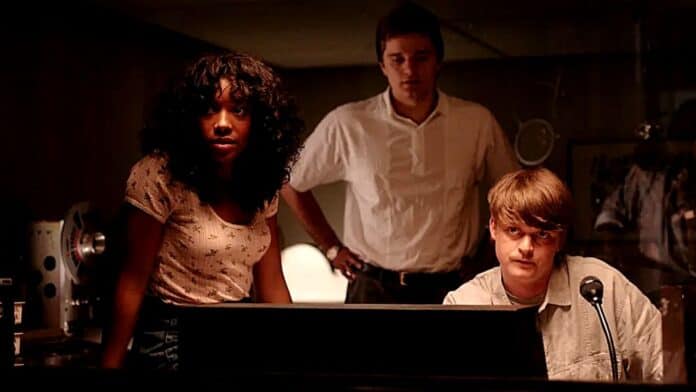Netflix’s new Dutch series, Dirty Lines, is a raunchy and realistic portrayal of The Netherlands’ urban counter-cultural scene during the 1980s.
Story
The series begins with the voiceover of an undergraduate psychology student, Marly, who joins Teledutch to make ends meet.
Teledutch, run by brothers, Frank and Ramon Stigter, makes sexual audiotapes accessible to everyone with a telephone line in The Netherlands. Business booms and so does the career and personal life of Marly.
But for the Stigter brothers, their growing involvement with the business and everything it deals with corresponds to conflicts in their personal life. Marly’s relationship with her best friend, Janna, gets complicated when she gets involved with her professor, Leon.
Charges of tax evasion hit the company, Ramon blames Frank for his extravagant lifestyle and carefree attitude towards expenses. This escalates into an argument about insecurities.
When the actual culprit is caught, their differences are settled and the company looks forward to its new era.
For Marly, her work becomes a way to experiment. After the publication of her thesis, she goes on to become a world-renowned sexologist. She resolves her relationship with Janna, and they take an ecstasy pill for the first time.
The Berlin Wall falls, symbolizing a new era in European society. A new decade begins, and the story concludes as Marly reflects on the changes that occurred over the 1980s, and anticipates the optimistic mood of the upcoming decade.
Performances
The performances of the entire case were noteworthy. Everyone stands out in their character. The actors perfectly capture the vibe of the era it represents.
Minnie Kool’s performance as Frank is the most fun to watch given the quirks of the character. Joy Delima, as Marly, flawlessly breaks the fourth wall, and although it is clumsy in parts, the trick to engage the audience works brilliantly.
Her character is also used to explore race dynamics in the beginning but is immediately sidelined after she reclaims her personality and voice.
Although she has a limited screen presence, Julia Akkermans’ Janna embodies the new countercultural woman of the 80s. She awes the viewers with both her personality and her voice.
Positives
The series has multiple exciting things going on it. It’s cleverly written and sustains interest throughout its entire runtime. It is as exciting in the last episodes as it is in the beginning.
The historical setting helps adds a plethora of sociopolitical elements to the storyline which propels it to something more than a story of rags to riches.
With the end of the Cold War, the fall of the Berlin Wall, and the unhindered rise of capitalism in Western Europe, the series successfully capitalizes on everything that was being capitalized on back then. The series is quite intentional about documenting Europe’s condition post-liberalization.
The exponential rise of technology, the popularity of drugs, house music, club culture, the AIDs epidemic everything finds its way into the story in a realistic manner.
In an otherwise topical show, conversations regarding homosexuality and toxic masculinity bring contemporary discussions to light.
Negatives
The series is quite satisfying but it tries to cram up a lot of ideas in less than 6 hours of running time. This meddles with the pacing at times.
Certain plot details come in randomly and do not mature as well as others. And certain subplots are left unfinished.
Verdict
Entertaining and exciting, in all ways imaginable, Dirty Lines is strongly recommended to adult viewers. Additionally, it can serve as an interesting account of 1980s Amsterdam for history and popular culture enthusiasts.
Rating: 3.5/5
Also Read: Dirty Lines summary and ending explained

